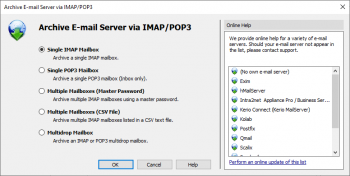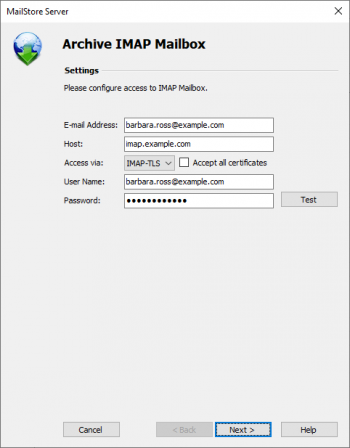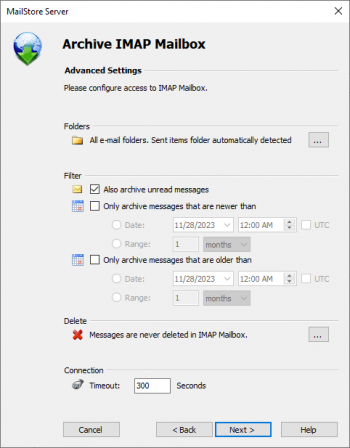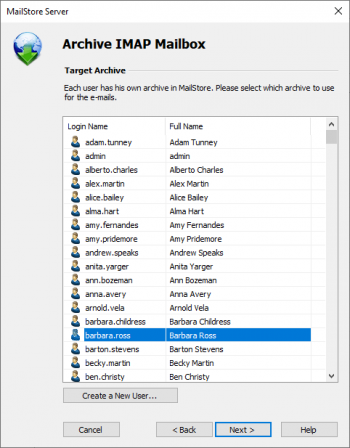Archiving Emails from Kolab
This implementation guide covers the specifics of archiving Kolab Server mailboxes. It is assumed that you already have a MailStore Server installation or test installation and are familiar with the fundamentals of MailStore Server. Please refer to the Manual or the Quick Start Guide for more information.
MailStore Server offers several ways to archive emails from Kolab Server mailboxes, which are described below. If you are not sure which archiving method best suits your company, please refer to the chapter Choosing the Right Archiving Strategy.
}
Synchronizing Users
Kolab comes with an integrated OpenLDAP directory server, but may also use other LDAP directory services to manage and authenticate users. As MailStore Server also supports Active Directory and other LDAP directory services (e.g. OpenLDAP), it is recommended to set up synchronization in MailStore as well. Additional information on synchronizing users can be found in the corresponding chapters of the MailStore Server manual:
Note: When batch-archiving IMAP mailboxes MailStore Server automatically creates non-existing users. The authentication type of those users will be set to MailStore-integrated.
Archiving Individual Mailboxes
In MailStore Server Kolab Server archiving tasks are stored in archiving profiles. By following the procedure described here you can archive a single Kolab Server mailbox for a specific MailStore user. The archiving process can be executed manually or automatically. You can find further information about executing archiving profiles in chapter Email Archiving with MailStore Basics.
- Users can only archive their own mailboxes to their personal user archive. To archive the emails of other users, you have to be logged on to MailStore Client as MailStore administrator. Only MailStore administrators can archive the emails of other users.
- In MailStore, click on Archive Email.
- To create a new archiving profile, select Other Server via IMAP/POP3 from the Email Servers list in the Create Profile area of the application window.
- A wizard opens guiding you through the setup process.
- Select Single Mailbox and click on OK.
- Fill out the fields Email Address, Host, Access via, User Name and Password. The Email Address is used to label the folder that is created in the archive by this profile. Click on Test to verify the data entered.
- For the IMAP-TLS and IMAP-SSL protocols only: If the certificate provided by the remote host cannot be verified (e.g. self-signed or signed by an unknown certificate authority), enable the option Accept all certificates to allow MailStore to establish a connection. As this option leads to an insecure configuration, warnings may appear in the summary and/or the dashboard.
- Click on Next.
- Customize the list of folders to be archived (IMAP only), the filter (IMAP only) and the deletion rules. By default, no emails will be deleted from a mailbox. The timeout value only has to be adjusted as needed (e.g. with very slow servers).
- Click on Next.
- If logged on to MailStore Server as administrator, the target archive can be specified at the next step. Select the archive of the user for whom the mailbox is to be archived.
- At the last step, a name for the new archiving profile can be specified. After clicking on Finish, the archiving profile will be listed under Saved Profiles and can be run immediately, if desired.
Archiving Multiple Mailboxes in One Step
When archiving multiple mailboxes, Kolab works the same as any other email server. Please refer to the chapter Multiple IMAP Mailboxes (CSV File) in the help article Batch Archiving of IMAP Mailboxes in the MailStore manual.
Archiving Incoming and Outgoing Emails Directly
To send and receive emails, Kolab Server uses the mail transfer agent Postfix. To archive all incoming and outgoing emails directly in a Kolab environment, please refer to Archiving Emails from Linux-based Email Servers.




